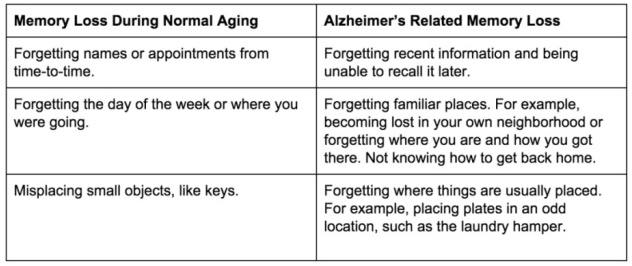Many people worry about becoming forgetful. They think forgetfulness is the first sign of Alzheimer's disease. But not all people with memory problems have Alzheimer's. Other causes for memory problems can include aging, medical conditions, emotional problems, mild cognitive impairment, or another type of dementia. Forgetfulness can be a normal part of aging.
As people get older, changes occur in all parts of the body, including the brain. As a result, some people may notice that it takes longer to learn new things, they don't remember information as well as they did, or they lose things like their glasses. These usually are signs of mild forgetfulness, not serious memory problems, like Alzheimer's disease. It may be hard to know the difference between age-related changes and the first signs of Alzheimer's disease.
Ask yourself: Is this something new? For example, if a person was never good at balancing a checkbook, struggling with this task is probably not a warning sign. But if the ability to balance a checkbook has changed significantly, it is something to share with a doctor. People tend to forget things as they get older. But at what point does it go beyond the regular symptoms of old age and become symptoms of Alzheimer's disease?
Getting older can result in memory loss, whereas Alzheimer's disease can lead to loss of cognition, the mental action or process of acquiring knowledge and understanding through thought, experience, and the senses. This includes memory, in addition to things like understanding, communication, and reasoning.
Some people may recognize changes in themselves before anyone else notices. Other times, friends and family will be the first to observe changes in a person's memory, behavior or abilities. Memory loss that disrupts daily life may be a symptom of Alzheimer's or another dementia. Alzheimer's is a brain disease that causes a slow decline in memory, thinking and reasoning skills.

There are 10 early warning signs and
symptoms. Every individual may experience one or more of these signs
in a different degree.
1)
Memory changes that disrupt daily life.
One of the most common signs of Alzheimer's, especially in the early stages, is forgetting recently learned information. Others include forgetting important dates or events; asking for the same information over and over; relying on memory aides (e.g., reminder notes or electronic devices) or family members for things they used to handle on their own.
What's typical?
Sometimes
forgetting names or appointments, but remembering them later.
Some people may experience changes in their ability to develop and follow a plan or work with numbers. They may have trouble following a familiar recipe or keeping track of monthly bills. They may have difficulty concentrating and take much longer to do things than they did before.
What's typical?
Making
occasional errors when balancing a checkbook.
3) Difficulty
completing familiar tasks at home, at work or at leisure.
People with Alzheimer's often find it hard to complete daily tasks.
Sometimes, people may have trouble driving to a familiar location,
managing a budget at work or remembering the rules of a favorite
game.
What's typical? Occasionally
needing help to use the settings on a microwave or to record a
television show.
4) Confusion with time or place.
People with Alzheimer's can lose track of dates, seasons and the
passage of time. They may have trouble understanding something if it
is not happening immediately. Sometimes they may forget where they
are or how they got there.
What's typical? Getting
confused about the day of the week but figuring it out later.
5) Trouble understanding visual images and spatial relationships.
For some people, having vision problems is a sign of Alzheimer's.
They may have difficulty reading, judging distance and determining
color or contrast. In terms of perception, they may pass a mirror
and think someone else is in the room. They may not realize they are
the person in the mirror.
What's typical? Vision
changes related to cataracts.
6) New problems
with words in speaking or writing.
People with Alzheimer's may have trouble following or joining a conversation. They may stop in the middle of a conversation and have no idea how to continue or they may repeat themselves. They may struggle with vocabulary, have problems finding the right word or call things by the wrong name (e.g., calling a "watch" a "hand-clock").
What's typical?
Sometimes
having trouble finding the right word.
7) Misplacing
things and losing the ability retrace steps.
A person with Alzheimer's disease may put things in unusual places.
They may lose things and be unable to go back over their steps to
find them again. Sometimes, they may accuse others of stealing. This
may occur more frequently over time.
What's typical? Misplacing
things from time to time, such as a pair of glasses or the remote
control.
8) Decreased or
poor judgement.
People with Alzheimer's may experience changes in judgment or
decision-making. For example, they may use poor judgment when
dealing with money, giving large amounts to telemarketers. They may
pay less attention to grooming or keeping themselves clean.
What's typical? Making a bad
decision once in a while.
9) Withdrawal from
work or social activities.
A person with Alzheimer's may start to remove themselves from
hobbies, social activities, work projects or sports. They may have
trouble keeping up with a favorite sports team or remembering how to
complete a favorite hobby. They may also avoid being social because
of the changes they have experienced.
What's typical? Sometimes
feeling weary of work, family and social obligations.
10) Changes in mood and personality.
The mood and personalities of people with Alzheimer's can change.
They can become confused, suspicious, depressed, fearful or anxious.
They may be easily upset at home, at work, with friends or in places
where they are out of their comfort zone.
What's typical? Developing
very specific ways of doing things and becoming irritable when a
routine is disrupted.
Source:
Alzheimer's
Association
Related Articles:
- Signs of Early On-Set Alzheimer's
- Age Related Memory Loss: Possible Causes
- How to Choose an Alzheimer's Care Facility
- Alzheimer's Disease Statistics: Paying for Alzheimer's Care
- Resources for Alzheimer's Caregivers
- What is Memory Care? Benefits of Memory Care Facilities
- Dementia and the Music Therapy Connection
- Alzheimer's Patients with Sundowning Syndrome
- The Montessori Method for Dementia Care
- Alzheimer's Risk Factors and Prevention
- Respite Care for Dementia Caregivers
- The Difference Between Alzheimer's and Dementia
- Correlation Between Cardiovascular Exercise & Alzheimer's Disease
- Texas Silver Alert: Helping Find Our Missing Elderly
- GPS Tracking Device's for Alzheimer's Patients
Home | About | Articles | Resources | Site Map | Privacy Policy
Elder Options of Texas
Copyright 2001-2024
All Rights Reserved
DISCLAIMER: Links to other websites or references to products, services or publications do not imply the endorsement or approval of such websites, products, services or publications by Elder Options of Texas. The determination of the need for senior care services and the choice of a facility is an extremely important decision. Please make your own independent investigation.


